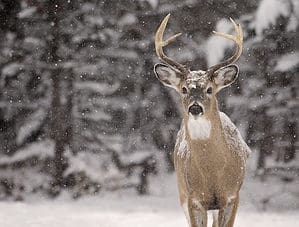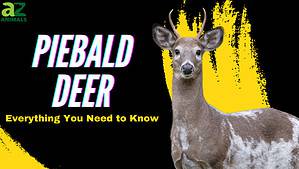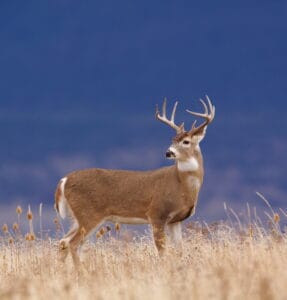Deer season is generally open in Tennessee from late September to early January. The dates depend on the year and the season type (Archery, Gun, etc.).
The bag limits for buck and does also depends on these criteria. Before hunting, you should check the current Tennessee Wildlife Resources Agency (TWRA) requirements for licenses, supplemental licenses, and other requirements.
Hunting License Requirements
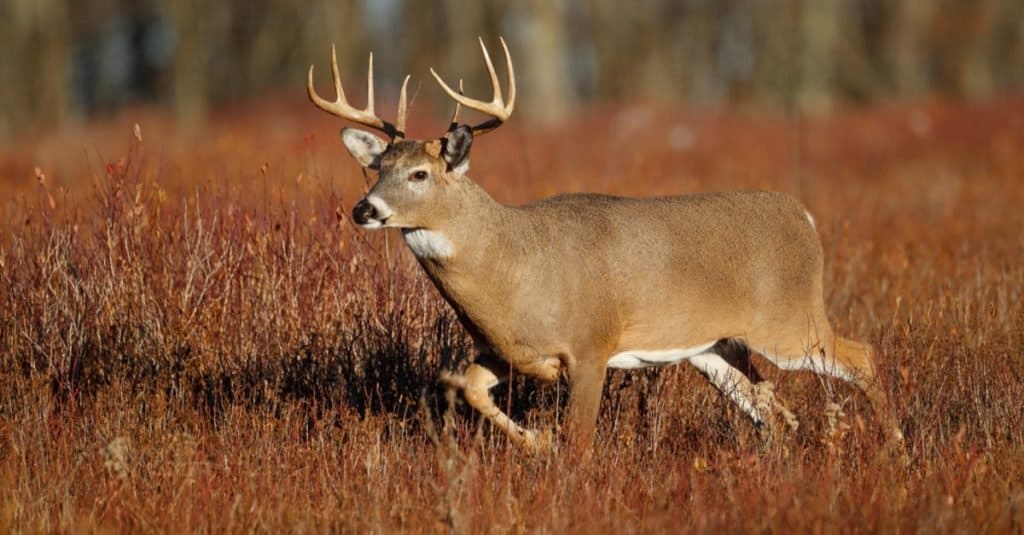
White-tailed deer are commonly hunted across Tennessee
©Paul Tessier/Shutterstock.com
Everyone hunting in the state of Tennessee is required to obtain a license. These can be obtained on the TWRA’s website or at many retailers in the state. Out-of-state residents wishing to hunt in TN must obtain a TN Non-Resident Hunting License; a license from another state is not valid.
In addition, when deer hunting, one must obtain a big game supplemental license. Each season type has a supplemental license (Gun, Archery, and Muzzleloader). There may be other special discounted licenses or requirements for juveniles or senior citizens, so check the regulations before you purchase a license.
There are also options for a lifetime sportsman license; the cost depends on the individual’s age. Hunters born after Jan 1, 1969, must also possess proof that they have completed a hunter education course. Courses from all other states are accepted. This course is offered both online and in person and is free of charge at tnwildlife.org.
Deer Season Types
Tennessee has three basic Season types: Archery, Muzzleloader, and Gun. Archery season typically starts on the fourth Saturday in September and continues through late October.
For the most part, archery season is also open through the muzzleloader and gun seasons. Muzzleloader season opens on the third Saturday before Thanksgiving and lasts two weeks before the gun season opens the Saturday before Thanksgiving.
Once gun season opens, all season types are available for sportsmen to choose from. Once a hunter achieves their bag limit on one season type, they must move to another season type to harvest more deer.
There are also usually two weekends (one in late October and one in mid-January) where all seasons are closed to adults and open to only juveniles 6-16 years of age. A non-hunting, licensed adult over the age of 21 must accompany the youth hunter and be in a position to take control of the hunting device.
This is a great time to teach children without the competition from other adults. All hunting devices are open to juveniles these weekends (Archery, Muzzleloader, and Gun). Depending on the age of the youth, there are different license requirements.
However, all ten and older youths must have taken the Hunter Education course. These are sometimes offered at school, and the in-person classes are far more fun for kids. At the end of the class, there is usually a firearms safety portion and even live fire range time, which is a lot of fun if a range is nearby and available.
Season Type Regulations
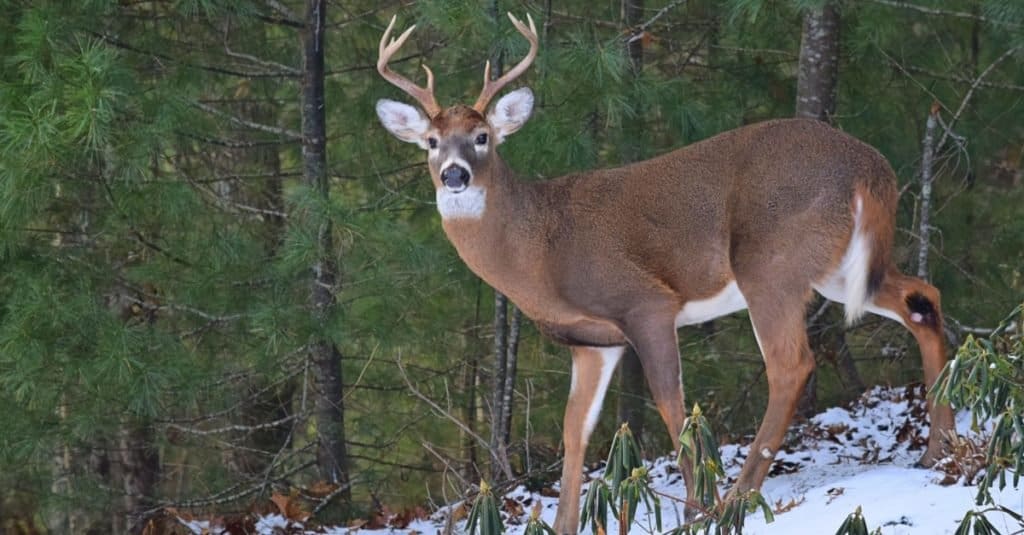
White-tailed deer standing in the snow in the winter.
©Michael Sean OLeary/Shutterstock.com
Depending on the season type, hunters must use an approved hunting device that corresponds to their supplemental license during the dates that the season is open.
Archery Season
Hunters may use any device that uses an arrow as a projectile, such as compound bows, longbows, recurve bows, and crossbows. Some special conditions apply to pre-charged pneumatic guns that shoot an arrow and are usually only allowed for those with a permanent disabled license. Hunters cannot use firearms during this season.
Muzzleloader Season
Muzzleloaders are firearms in which the projectile must be loaded from the barrel’s muzzle (front) end, and the firearm must not allow projectiles to be loaded from the breech (rear) end of the barrel.
Muzzleloading tifles and handguns at least .36 caliber or more significant may be used. Muzzleloading shotguns may be used. However, they must be loaded with a single ball or slug. Other types of firearms may not be used during this season.
Gun Season
Guns used during the gun season are rifles, handguns, and shotguns that use centerfire ammunition. Rifles and handguns may not be used 30 minutes after sunset to 30 minutes before sunrise. Shotguns must use ammunition with a single solid ball or slug.
Overall Regulations and Safety
Below are some of the critical regulations to keep in mind. This is not an extensive list, and hunters should review the TWRA hunting guide before hunting.
- Hunting from a vehicle, even if stationary, is prohibited. The only exception is while in or on a vehicle that is not legal to operate on a public highway while on private property, such as an ATV.
- Hunters must wear on the upper portion of their body and head a minimum of 500 square inches of daylight fluorescent orange visible from the front and back. Typically a hat and a vest fulfill these requirements. The only exception is during archery-only season.
- In Tennessee, bag limits are determined by antlered and antlerless deer, which are not necessarily males and females. antlered deer is a male or female deer with at least one antler that is a minimum of 3 inches in length. antlerless deer is a male or female with no antlers or antlers less than 3 inches in length.
- Simple possession of ammunition that is not allowed is prohibited. If you use a shotgun for hunting deer and small game, ensure you have the correct ammunition and check every round before you leave to go to the field.
- Using dogs to track and pursue deer during hunting is not allowed. Taking or attempting to take a deer is not allowed in this situation, even if they are not your dogs. Be patient and safe if you see a deer running or hear dogs. Wait on the next one.
Safety should always be in the front of a hunter’s mind. Anytime firearms are involved, it is paramount to handle them with respect and to be sure of your target and, just as important, what is beyond your target. A common misconception is that most hunting accidents are firearm related. The most significant number of injuries from hunting accidents comes from hunters falling out of tree stands. If you are using a tree stand, be sure you always use a safety strap to catch you in case you lose your balance.
Chronic Wasting Disease Concerns in Tennessee
Chronic Wasting Disease (CWD) is a contagious disease that has affected the deer population in the United States. The main symptoms are difficulty in movement and weight loss over time.
An infected deer can also appear confused, nervous, and unaware of its surroundings. Chronic Wasting Disease has been detected in West Tennessee, and the TWRA has restrictions to reduce the spread. The transportation of deer carcasses, in general, is prohibited in the affected counties. For an up-to-date list of counties and details on the current regulations, see www.cwaintennessee.com .
The TWRA has also incentivized hunters to assist with CWD management during the 2022-2023 season. In the CWD counties, the bag limits for antlered deer are higher. If the hunter harvests a buck and submits it for CWD testing, they will earn the right to harvest an additional buck over their current limit.
Hunters can earn an unlimited number of additional bucks with this program. If a hunter has one deer that tests positive, they will be rewarded with a $75 voucher good for processing fees at a participating deer processor.
If a hunter harvests two or more CWA-positive deer, they will receive an annual sportsman’s license for 2023 free of charge. These programs can change each year so verify with the TWRA beforehand.
What to do After a Deer is Harvested?
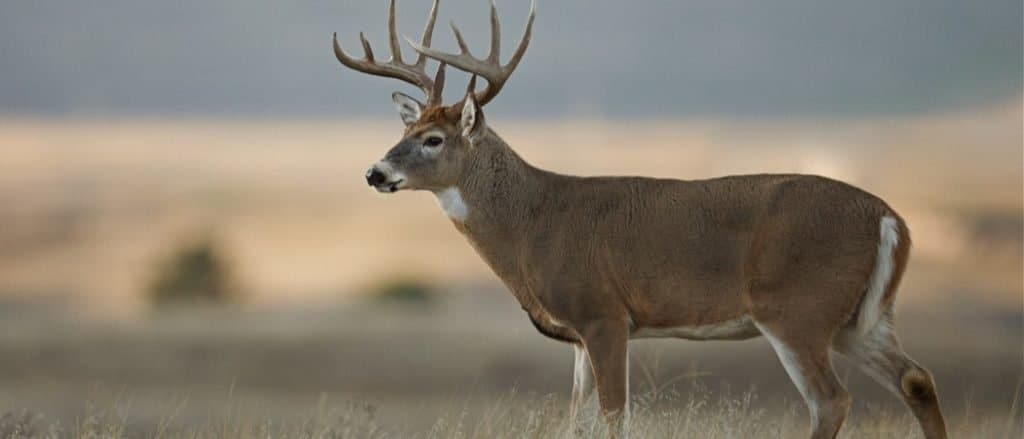
White-tailed deer are large animals which make them popular as trophies
©Tom Reichner/Shutterstock.com
After a deer is harvested, it may be field dressed, quartered, and the meat iced down. Most simply field dress the deer. This should not destroy evidence of the animal’s species, sex, or antlered status.
The deer then should be tagged with one of the temporary tags that comes with the supplemental licenses. Next, hunters should take the deer to a check-in station, or Check-in can be done on the internet. Check-in must be done before midnight the day the deer was harvested.
As an alternative, hunters can use TWRA’s mobile phone app called TWRA on the Go for tagging and check-in. After you have the harvest confirmation number, you can take the deer to your favorite deer processor and taxidermist.
Fines for Not Following Regulations
Fines and court costs can be high in Tennessee, and violations can result in losing hunting gear and equipment. In some cases, the equipment can even include the vehicle that a hunter drove to the hunting site, which authorities can take in the field at the time of the violation.
Up Next
- Deer Season In Montana: Everything You Need To Know To Be Prepared
- Deer Population By State: How Many Deer Are In The US?
- The Largest Whitetail Deer Ever Recorded
- The 10 Largest Deer In The World
The photo featured at the top of this post is ©
Sources
- Tennesee State, Available here: https://www.tn.gov/content/dam/tn/twra/documents/guide/TN-Hunting-Guide-22-23.pdf
- Tennessee State, Available here: https://www.tn.gov/twra/hunting/tennessee-hunting-seasons-summary.html
Thank you for reading! Have some feedback for us? Contact the AZ Animals editorial team.



